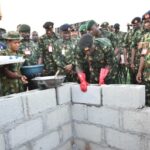By Augustine Ehikioya
Some panelists in a webinar discussion on Tuesday called on governments and Nigerians generally to go back to the basis in order to end insecurity in the country.

Stressing that what Nigerians are mostly seeing today are the military measures, the panelists sought for more focus on non-military measures to quell the growing insecurity in the country.
They also advocated for tackling of the root causes of the insecurity rather than treating the symptoms.
The discussion, which was organized by Ocean and Oil Holdings (Oando PLC), was entitled “The State of Insecurity in Nigeria: The Tripping Point”.

Monitored by Security Watch Africa (SWA), the discussion was anchored by Oando PLC’s General Manager, Business Support Group, Ademola Ogunbanjo.

Setting the stage for the discussion to begin, Ogunbanjo noted: “Our peace is currently being challenged significantly. The voice of secession has never been loudest like this, not even during the civil war”.
Speaking at the webinar discussion, Patrick Agbambu, who is a Security and Public Safety Advocate, Security Analyst, President/CEO of Security Watch Africa Initiatives, listed the insecurity problem under two major categories, the grassroot/local insecurity and urban crime.
On the rural insecurity, he said “Most of the abductions that are taking place are in the rural areas and the biggest problem is non communication between the government, political class and the communities.
“They only see the political class when election is coming. There is a disconnect in communication. There is absent of amenities, they don’t feel a sense of belonging. Those elected don’t go back home to assure them. The society has lost hope in the government, the people they respect are the bandits, who they feel provide some succour for them”, he said.
Agbambu stressed the need to engage the traditional institutions to help communicate properly with communities, “Government need to engage respectable and responsible traditional leaders to win back the people and take development to the communities.
“There are many ungoverned space in the country, so terrorists and bandits are filling the space”, he emphasised.
For the urban insecurity, Agbambu said “The problem is that there is a lot of disconnect, even in the family cycle. They don’t educate their children like in the past. The criminals are the people they respect. We need to go back to the basis and not just treating the symptoms of insecurity. We need to check how we can get the family back to what it used to be”.
The Executive Secretary/CEO of Ogun State Security Trust Fund, Opeyemi Agbaje, was asked to speak on how far Nigeria has veered off from the commitment to build a nation where peace and justice reign as stated in the second stanza of the National anthem.
Responding, he said that the commitment to peace, unity, security, freedom of the people, is at the lowest ebb since independence.
He said “What strikes me as we ponder these questions of insecurity, threat to unity, agitation, is that we must start by focusing not on the symptoms we see, but on the fundamental causes driving the symptoms we see.
“We have to remove our emotions and focus our attention on what we think is driving all of this”.
At the levels of families, we must focus on education of our youth, focus on engaging the youths, keeping them employed, giving them skills and competencies. We must try to eliminate harmful social cultural practices.
“Insecurity is now not just a political problem or a government problem, or a problem for the military, it has become a major driver of economic stagnancy”, he said.
Agbaje went on “So we all now must have a vast economic incentive to ensure that we deal with this. Insecurity is now driving low GDP growth, contribute to declining investment, foreign and domestic investment.
“It’s driving down some sectors like agriculture, transport, trade, haulage. So we are talking about a factor that threatens the political unity of the country and also threatens the economic ability of a nation”, he stated.
A Postdoctoral Research Fellow at New York University Center for the study of Africa, Dr. Olajumoke Ayandele, regretted that Nigeria has experienced unfortunate increase in the amount spent on arming the military in the last decade to the detriment of developmental infrastructures.
She also categorized the main insecurity in the country under four headings including the 11 years insurgency being raged by Boko Haram, inter-communal clashes between terrorists and farmers, militia kidnapping for ransom, and secessionist movements in parts of the country.
She also noted that present measures are insufficient to restore stability and protect communities in the country.
As a way forward, she said “We should include more local actors in the framework at the local, state and the Federal levels. In stabilizing Nigeria, these actors cannot be understated. Traditional leaders, religious leaders, women, youth, are all important stakeholders.
“More emphasis must be placed on developing essential infrastructures by all levels of government. More funding is needed for these development.” She stated.
On his part, Captain Aliyu Umar (Rtd), who is a National Security Resource and Solution-Options Consultant, said that what Nigerians are presently seeing as a response to insecurity is military plans.
Stressing that, that is not enough, he said “There has to be education, economic, agricultural plans. They are mutually complementing. We should be able to look beyond the boots and guns”.








